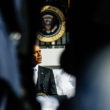Former diplomat Peter Galbraith might have compromised his integrity by investing in oil ventures in Kurdistan and writing about Iraq without revealing that he was advising the Kurds at the same time. He was prescient, however, in The New York Review of Books in 2004. He wrote:
In my view, Iraq is not salvageable as a unitary state. From my experience in the Balkans, I feel strongly that it is impossible to preserve the unity of a democratic state where people in a geographically defined region almost unanimously do not want to be part of that state. I have never met an Iraqi Kurd who preferred membership in Iraq if independence were a realistic possibility….
The best hope for holding Iraq together — and thereby avoiding civil war — is to let each of its major constituent communities have, to the extent possible, the system each wants. This, too, suggests the only policy that can get American forces out of Iraq. In the north this means accepting that Kurdistan will continue to govern its own affairs and retain responsibility for its own security.
In the south, Iraq’s Shiites want an Islamic state. They are sufficiently confident of public support that they are pushing for early elections. The United States should let them have their elections, and be prepared to accept an Islamic state — but only in the south. We can hope that if the Sunni Arabs feel more secure about their place in Iraq with respect to the Shiites and the Kurds, they will be relatively more moderate. Autonomy for the Sunni Arab parts of Iraq is a way to provide such security…. This model would solve many of the contradictions of modern Iraq.






0 Comments